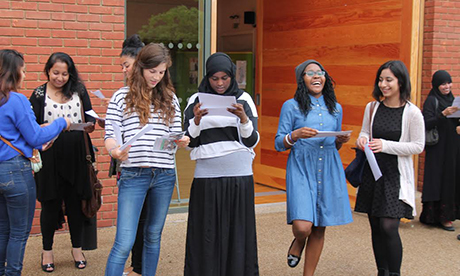Improved GCSE results in Hackney, but are our schools making the grade?

Pupils at Clapton Girls’ Academy collect their GCSE results last August. Photograph: Clapton Girls’ Academy
National GCSE results for 2013 have been released, giving way to the usual data-slinging match between the Department for Education (DfE) and its critics.
The plot it set to thicken with a fresh set of evaluation reforms starting this year which could paint a very different picture in terms to come.
Hackney’s combination of free schools, maintained schools and academies performed well across the board regardless of school structures – so any debate is more about how to attribute their success than who to blame for any failure.
Across the borough, 61.2 per cent of pupils achieved five or more A*-C GCSE grades including in English and maths. This is a slight increase from 2012 in a decade of steadily-climbing results locally and beats the national average of 60.6 per cent.
Nearly 50 per cent of pupils who receive free school meals achieved the national headline measure – five or more A*-C grades including English and maths – compared to 38.1 per cent nationally.
But next time around, things are set to change – from this year, many GCSE equivalents will be stripped from the data set, while others will count for less.
The change follows concern that some schools in England were manipulating the value of equivalents to ‘game’ the system by inflating their results.
A closer look at the local data reveals that even by next year’s standards, Hackney schools would have performed almost as well.
By stripping equivalents from the equation, a comparison can be made between this year’s published results, which incorporate equivalents, and what they would have been if they were taken out – as they will be next year.
Though not all GCSE equivalents are to be scrapped from the equation, cross-referencing the data provides a hint at whether this year’s results would pass muster by next year’s standards. Nationally, there were a range of discrepancies.
An analysis of the data by Henry Stewart, a governor at the Stoke Newington School and a founder of the Local Schools Network, shows that every school in Hackney is under the national average for use of equivalents.
According to Stewart’s calculations, the average drop in results after taking equivalents out in Hackney is 3 per cent – less than half the national average of 7.3 per cent.
The average drop for stand-alone academies is 13.6 per cent, with academy chains trumping them all at 15.2 per cent.
These high percentages among academies and academy chains will add to suspicions that Michael Gove’s flagship initiative to centralise control of schools has not produced superior results to the maintained sector.
Of the six most improved schools in the country this year, only two are academies.
In the case of academy chains (groups operating 70 or more schools, such as Harris and ARK), this would also inflate their success as a group, improving their reputation and increasing their chances of opening more schools.
Academy chains may be brought in by the Department for Education as sponsors for failing schools who are forced to convert.
No academy chains have been asked to sponsor schools in Hackney, though six of the borough’s 16 secondary schools are stand-alone academies, with Mossbourne Community Academy set to expand to a seventh this year.
But, argues Stewart: “there is a big difference between individual schools focused on the results of one set of students and chains that may have grown beyond their capacity to be effective”.
The DfE has no established means of inspecting the management of academy chains, (as they do with local authorities), which hold what Stewart calls a “strange independent status” which has led to criticism about a lack of management transparency that may allow them to inflate their results.
Stewart puts the borough’s success at least partly down to Hackney’s ‘family of schools’ approach, under which academies and maintained schools alike answer to a “strong local authority – even with academies we can hold all schools to account,” referring to the unusual status of the Hackney Learning Trust, which holds authority over all of the borough’s schools regardless of their structures.
